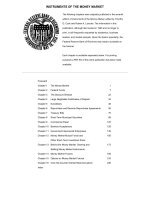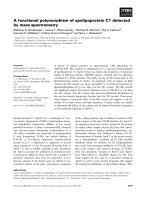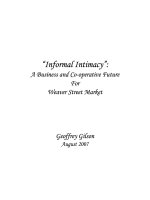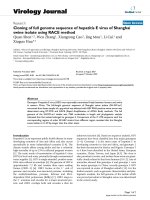The Project Gutenberg E Book of Lombard Street: A Description of the Money Market, by Walter Bagehot doc
Bạn đang xem bản rút gọn của tài liệu. Xem và tải ngay bản đầy đủ của tài liệu tại đây (1.2 MB, 672 trang )
The Project Gutenberg EBook of Lombard
Street: A Description of the Money
Market, by Walter Bagehot
This eBook is for the use of anyone
anywhere at no cost and with almost no
restrictions whatsoever. You may copy it,
give it away or re-use it under the terms of
the Project Gutenberg License included
with this eBook or online at
www.gutenberg.org
Title: Lombard Street: A Description of
the Money Market
Author: Walter Bagehot
Posting Date: October 29, 2010
Release Date: August, 2003 [Etext #4359]
[This file last updated November 5, 2010]
Language: English
*** START OF THIS PROJECT
GUTENBERG EBOOK LOMBARD
STREET ***
Produced by Edited by Charles Aldarondo
()
LOMBARD
STREET
A Description of the Money Market.
By WALTER BAGEHOT
CHAPTER I.
Introductory.
I venture to call this Essay 'Lombard
Street,' and not the 'Money Market,' or any
such phrase, because I wish to deal, and to
show that I mean to deal, with concrete
realities. A notion prevails that the Money
Market is something so impalpable that it
can only be spoken of in very abstract
words, and that therefore books on it must
always be exceedingly difficult. But I
maintain that the Money Market is as
concrete and real as anything else; that it
can be described in as plain words; that it
is the writer's fault if what he says is not
clear. In one respect, however, I admit
that I am about to take perhaps an unfair
advantage. Half, and more than half, of the
supposed 'difficulty' of the Money Market
has arisen out of the controversies as to
'Peel's Act,' and the abstract discussions
on the theory on which that act is based, or
supposed to be based. But in the ensuing
pages I mean to speak as little as I can of
the Act of 1844; and when I do speak of it,
I shall deal nearly exclusively with its
experienced effects, and scarcely at all, if
at all, with its refined basis.
For this I have several reasons,—one, that
if you say anything about the Act of 1844,
it is little matter what else you say, for
few will attend to it. Most critics will
seize on the passage as to the Act, either
to attack it or defend it, as if it were the
main point. There has been so much fierce
controversy as to this Act of Parliament—
and there is still so much animosity—that
a single sentence respecting it is far more
interesting to very many than a whole
book on any other part of the subject. Two
hosts of eager disputants on this subject
ask of every new writer the one question
—Are you with us or against us? and they
care for little else. Of course if the Act of
1844 really were, as is commonly thought,
the primum mobile of the English Money
Market, the source of all good according
to some, and the source of all harm
according to others, the extreme irritation
excited by an opinion on it would be no
reason for not giving a free opinion. A
writer on any subject must not neglect its
cardinal fact, for fear that others may
abuse him. But, in my judgment, the Act of
1844 is only a subordinate matter in the
Money Market; what has to be said on it
has been said at disproportionate length;
the phenomena connected with it have
been magnified into greater relative
importance than they at all deserve. We
must never forget that a quarter of a
century has passed since 1844, a period
singularly remarkable for its material
progress, and almost marvellous in its
banking development. Even, therefore, if
the facts so much referred to in 1844 had
the importance then ascribed to them, and
I believe that in some respects they were
even then overstated, there would be
nothing surprising in finding that in a new
world new phenomena had arisen which
now are larger and stronger. In my opinion
this is the truth: since 1844, Lombard
Street is so changed that we cannot judge
of it without describing and discussing a
most vigorous adult world which then was
small and weak. On this account I wish to
say as little as is fairly possible of the Act
of 1844, and, as far as I can, to isolate and
dwell exclusively on the 'Post-Peel'
agencies, so that those who have had
enough of that well-worn theme (and they
are very many) may not be wearied, and
that the new and neglected parts of the
subject may be seen as they really are.
The briefest and truest way of describing
Lombard Street is to say that it is by far
the greatest combination of economical
power and economical delicacy that the
world has even seen. Of the greatness of
the power there will be no doubt. Money
is economical power. Everyone is aware
that England is the greatest moneyed
country in the world; everyone admits that
it has much more immediately disposable
and ready cash than any other country. But
very few persons are aware how much
greater the ready balance—the floating
loan-fund which can be lent to anyone or
for any purpose—is in England than it is
anywhere else in the world. A very few
figures will show how large the London
loan-fund is, and how much greater it is
than any other. The known deposits—the
deposits of banks which publish their
accounts—are, in
London (31st December, 1872)
120,000,000 L
Paris (27th February, 1873) 13,000,000
L
New York (February, 1873) 40,000,000
L
German Empire (31st January, 1873)
8,000,000 L
And the unknown deposits—the deposits
in banks which do not publish their
accounts—are in London much greater
than those many other of these cities. The
bankers' deposits of London are many
times greater than those of any other city
—those of Great Britain many times
greater than those of any other country.
Of course the deposits of bankers are not a
strictly accurate measure of the resources
of a Money Market. On the contrary, much
more cash exists out of banks in France
and Germany, and in all non-banking
countries, than could be found in England
or Scotland, where banking is developed.
But that cash is not, so to speak, 'money-
market money:' it is not attainable.
Nothing but their immense misfortunes,
nothing but a vast loan in their own
securities, could have extracted the hoards
of France from the custody of the French
people. The offer of no other securities
would have tempted them, for they had
confidence in no other securities. For all
other purposes the money hoarded was
useless and might as well not have been
hoarded. But the English money is
'borrowable' money. Our people are
bolder in dealing with their money than
any continental nation, and even if they
were not bolder, the mere fact that their
money is deposited in a bank makes it far
more obtainable. A million in the hands of
a single banker is a great power; he can at
once lend it where he will, and borrowers
can come to him, because they know or
believe that he has it. But the same sum
scattered in tens and fifties through a
whole nation is no power at all: no one
knows where to find it or whom to ask for
it. Concentration of money in banks,
though not the sole cause, is the principal
cause which has made the Money Market
of England so exceedingly rich, so much
beyond that of other countries.
The effect is seen constantly. We are
asked to lend, and do lend, vast sums,
which it would be impossible to obtain
elsewhere. It is sometimes said that any
foreign country can borrow in Lombard
Street at a price: some countries can
borrow much cheaper than others; but all,
it is said, can have some money if they
choose to pay enough for it. Perhaps this
is an exaggeration; but confined, as of
course it was meant to be, to civilised
Governments, it is not much of an
exaggeration. There are very few civilised
Governments that could not borrow
considerable sums of us if they choose,
and most of them seem more and more
likely to choose. If any nation wants even
to make a railway—especially at all a
poor nation—it is sure to come to this
country—to the country of banks—for the
money. It is true that English bankers are
not themselves very great lenders to
foreign states. But they are great lenders to
those who lend. They advance on foreign
stocks, as the phrase is, with 'a margin;'
that is, they find eighty per cent of the
money, and the nominal lender finds the
rest. And it is in this way that vast works
are achieved with English aid which but
for that aid would never have been
planned.
In domestic enterprises it is the same. We
have entirely lost the idea that any
undertaking likely to pay, and seen to be
likely, can perish for want of money; yet
no idea was more familiar to our
ancestors, or is more common now in
most countries. A citizen of London in
Queen Elizabeth's time could not have
imagined our state of mind. He would
have thought that it was of no use
inventing railways (if he could have
understood what a railway meant), for you
would not have been able to collect the
capital with which to make them. At this
moment, in colonies and all rude
countries, there is no large sum of
transferable money; there is no fund from
which you can borrow, and out of which
you can make immense works. Taking the
world as a whole—either now or in the
past—it is certain that in poor states there
is no spare money for new and great
undertakings, and that in most rich states
the money is too scattered, and clings too
close to the hands of the owners, to be
often obtainable in large quantities for
new purposes. A place like Lombard
Street, where in all but the rarest times
money can be always obtained upon good
security or upon decent prospects of
probable gain, is a luxury which no
country has ever enjoyed with even
comparable equality before.
But though these occasional loans to new
enterprises and foreign States are the most
conspicuous instances of the power of
Lombard Street, they are not by any means
the most remarkable or the most important
use of that power. English trade is carried
on upon borrowed capital to an extent of
which few foreigners have an idea, and
none of our ancestors could have
conceived. In every district small traders
have arisen, who 'discount their bills'
largely, and with the capital so borrowed,
harass and press upon, if they do not
eradicate, the old capitalist. The new
trader has obviously an immense
advantage in the struggle of trade. If a
merchant have 50,000 L. all his own, to
gain 10 per cent on it he must make 5,000
L. a year, and must charge for his goods
accordingly; but if another has only
10,000 L., and borrows 40,000 L. by
discounts (no extreme instance in our
modern trade), he has the same capital of
50,000 L. to use, and can sell much
cheaper. If the rate at which he borrows
be 5 per cent., he will have to pay 2,000
L. a year; and if, like the old trader, he
make 5,000 L. a year, he will still, after
paying his interest, obtain 3,000 L. a year,
or 30 per cent, on his own 10,000 L. As
most merchants are content with much less
than 30 per cent, he will be able, if he
wishes, to forego some of that profit,
lower the price of the commodity, and
drive the old-fashioned trader—the man
who trades on his own capital—out of the
market. In modern English business,
owing to the certainty of obtaining loans
on discount of bills or otherwise at a
moderate rate of interest, there is a steady
bounty on trading with borrowed capital,
and a constant discouragement to confine
yourself solely or mainly to your own
capital.
This increasingly democratic structure of
English commerce is very unpopular in
many quarters, and its effects are no doubt
exceedingly mixed. On the one hand, it
prevents the long duration of great
families of merchant princes, such as
those of Venice and Genoa, who inherited
nice cultivation as well as great wealth,
and who, to some extent, combined the
tastes of an aristocracy with the insight
and verve of men of business. These are
pushed out, so to say, by the dirty crowd
of little men. After a generation or two
they retire into idle luxury. Upon their
immense capital they can only obtain low
profits, and these they do not think enough
to compensate them for the rough
companions and rude manners they must
meet in business. This constant levelling
of our commercial houses is, too,
unfavourable to commercial morality.
Great firms, with a reputation which they
have received from the past, and which
they wish to transmit to the future, cannot
be guilty of small frauds. They live by a
continuity of trade, which detected fraud
would spoil. When we scrutinise the
reason of the impaired reputation of
English goods, we find it is the fault of
new men with little money of their own,
created by bank 'discounts.' These men
want business at once, and they produce
an inferior article to get it. They rely on
cheapness, and rely successfully.
But these defects and others in the
democratic structure of commerce are
compensated by one great excellence. No
country of great hereditary trade, no
European country at least, was ever so
little 'sleepy,' to use the only fit word, as
England; no other was ever so prompt at
once to seize new advantages. A country
dependent mainly on great 'merchant
princes' will never be so prompt; their
commerce perpetually slips more and
more into a commerce of routine. A man
of large wealth, however intelligent,
always thinks, more or less 'I have a great
income, and I want to keep it. If things go
on as they are I shall certainly keep it; but
if they change I may not keep it.'
Consequently he considers every change
of circumstance a 'bore,' and thinks of
such changes as little as he can. But a new
man, who has his way to make in the
world, knows that such changes are his
opportunities; he is always on the look-out
for them, and always heeds them when he
finds them. The rough and vulgar structure
of English commerce is the secret of its
life; for it contains 'the propensity to
variation,' which, in the social as in the
animal kingdom, is the principle of
progress.
In this constant and chronic borrowing,
Lombard Street is the great go-between. It
is a sort of standing broker between quiet
saving districts of the country and the
active employing districts. Why particular
trades settled in particular places it is
often difficult to say; but one thing is
certain, that when a trade has settled in
any one spot, it is very difficult for
another to oust it—impossible unless the
second place possesses some very great
intrinsic advantage. Commerce is
curiously conservative in its homes,
unless it is imperiously obliged to
migrate. Partly from this cause, and partly
from others, there are whole districts in
England which cannot and do not employ
their own money. No purely agricultural
county does so. The savings of a county
with good land but no manufactures and no
trade much exceed what can be safely lent
in the county. These savings are first
lodged in the local banks, are by them sent
to London, and are deposited with London
bankers, or with the bill brokers. In either
case the result is the same. The money thus
sent up from the accumulating districts is
employed in discounting the bills of the
industrial districts. Deposits are made
with the bankers and bill brokers in
Lombard Street by the bankers of such
counties as Somersetshire and Hampshire,
and those bill brokers and bankers employ
them in the discount of bills from
Yorkshire and Lancashire. Lombard Street
is thus a perpetual agent between the two
great divisions of England, between the
rapidly-growing districts, where almost
any amount of money can be well and
easily employed, and the stationary and
the declining districts, where there is
more money than can be used.
This organisation is so useful because it is
so easily adjusted. Political economists
say that capital sets towards the most
profitable trades, and that it rapidly leaves
the less profitable and non-paying trades.
But in ordinary countries this is a slow
process, and some persons who want to
have ocular demonstration of abstract
truths have been inclined to doubt it









